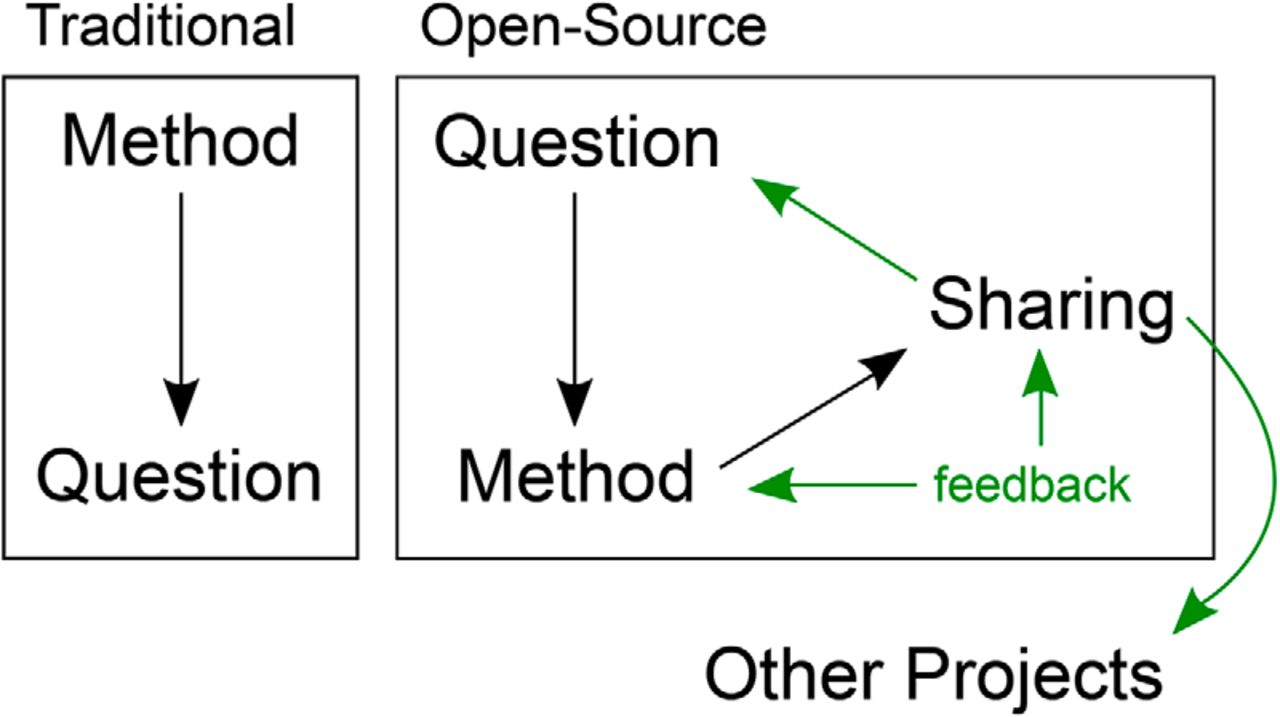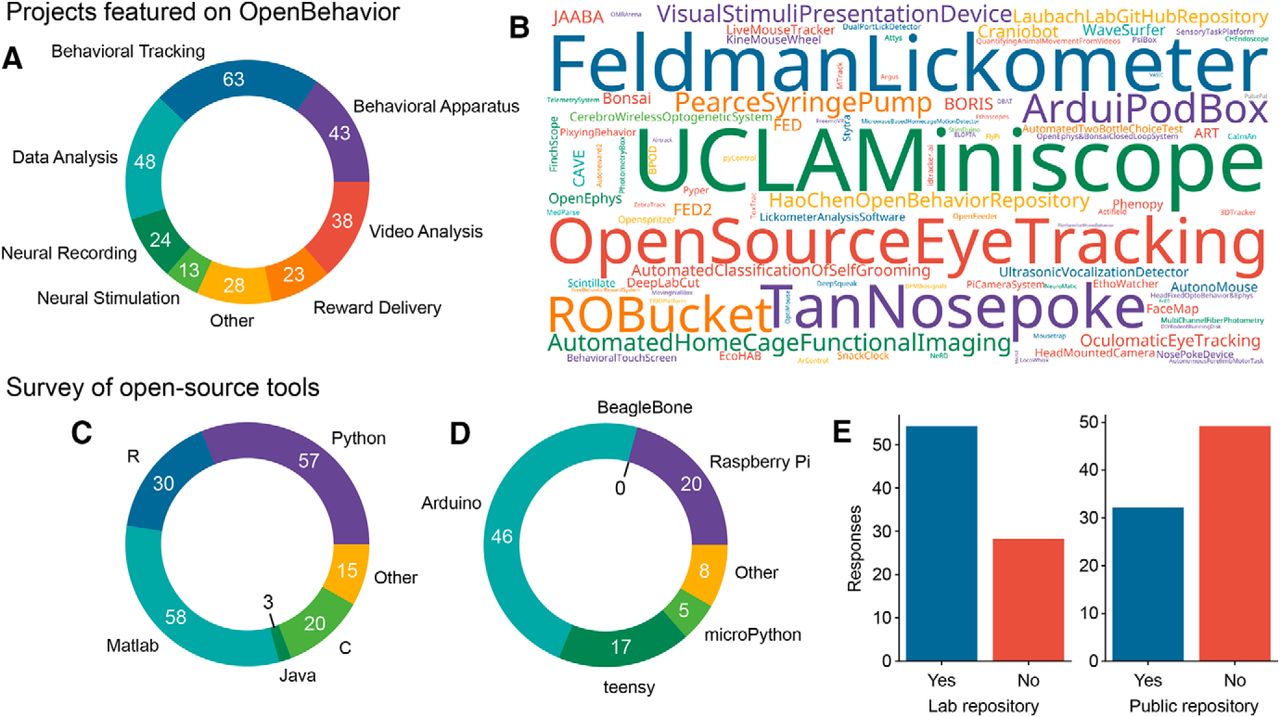
About The OpenBehavior Project and the Open Source Movement
What is the OpenBehavior Project and how did it start?
In 2016, it became clear that there were many projects reporting on new tools for the study of behavior, and thus we launched the OpenBehavior project. Access to design files and build instructions relied on word of mouth and isolated blogs and posts on social media. We made it our goal to disseminate information about tools as soon as they emerge as preprints on bioRxiv or PsyArXiv, peer-reviewed manuscripts, or independent posts by developers on Hackaday, GitHub, OSF.io, lab websites, or social media. The project is based around a website covering bleeding-edge open source tools and a related Twitter account that keeps followers up-to-date with new projects relevant to behavioral neuroscience across species such as flies, fish, rodents, and, more recently, humans. Through these efforts, we hope to contribute to the rapid replication and adoption of new tools into ongoing research and trigger modifications of existing tools for novel research applications.
To date, dozens of projects have been shared through www.openbehavior.com, with even more shared through active Twitter engagement. In May 2019, we celebrated our 100th open source project post. Our posts have thus far covered a wide variety of projects, such as devices for delivering rewarding foods and fluids, measuring home cage activity, video tracking and analysis, and physiologic methods used in behavioral experiments such as miniaturized microscopes and fiber photometry.
What is Open Source and what are the benefits?
The term “open source” is also often synonymous with being cost-effective. Many commercial products used in neuroscience can be replicated in an open source manner at a fraction of the initial cost. However, there are additional advantages to incorporating open source science in a research lab. With a recent increase in microcontrollers, microprocessors, 3D printing and laser-cutting technologies, most people now have access to create devices or products in a way that was previously unavailable to researchers. Additionally, a major benefit to open source science is the ability for customization and flexibility. Instead of being restricted to studying only what a commercial part is capable of doing or measuring, it is now possible to study a level deeper through developing a device or software that will help answer the research question, instead of letting the technology drive the research question. In behavioral neuroscience, this allows researchers to enter uncharted territory of analyzing previously unmeasured or fine-grained aspects of behavior.

Projects Posted to Date!

Latest Tweets and Blog Posts from OpenBehavior
The OpenBehavior Team

Mark Laubach, PhD
Co-founded The OpenBehavior Project in 2016.
Just vibin’ with his family, dog and two cats. Loves rock music, good beer, and the New York Mets.

Alexxai Kravitz, PhD
Co-founded The Open Behavior Project in 2016.
Loving the midwest way of life with his wife, daughter, and abundance of plants. Enjoys using open source tools to hack parenthood, and investigate plant communication.

Jibran Khokhar, PhD
Contributor for OpenBehavior and advocate for all things open source!
Rooting for the Toronto Raptors. When not chasing after his two sons, you can find him writing down all his credit card and ID numbers down in secret — just kidding! He has an stunning ability to keep them ALL memorized.

Jensen Palmer, MS
Managing the video respository and RRID initiaves.
Granite state transplant in DC for grad school. When not crushing experiments in the lab, you might find her playing pick-up field hockey, kicking rocks, playing the same song on repeat (@ Michelle Branch) or enjoying one of her favorites: pad thai.

Linda Amarante, PhD
A total badass who keeps OpenBehavior alive and well, mostly through a perfectly curated twitter timeline.
Multi-modal NUMTOT traversing the Seattle region. When not performing cool experiments or advocating for open source science, you can find her exploring Seattle, watering her plants, or playing and coaching softball.

Jude Frie, BAS, B.Sc.H.
A chill nerd creating content for OpenBehavior.
Just a Canadian addiction researcher, eh! Away from the lab he can be found drinking the strongest coffee and playing guitar for his cat (who happens to love Jack Johnson).

Samantha White, PhD
Content curation and website management.
Digging rabbit holes in decision making philosophy, satiety in reward-guided behavior, behavioral limitations of rodent species, and most recently, rock and roll. In her spare time she’s probably at a concert or spending time at the pool hall with friends.

Sean Bradley, PhD
Staff Scientist, NIMH (Contractor) – Bethesda, MD
Contributer for OpenBehavior

Kevin Chavez Lopez, BS
Managing the 3D print repository, generating content, and working on OB Workshops.
One of the funniest people you’ll meet. 3D print expert on the hunt for a good lunch. When not in his cave in the lab, you’ll find him exploring the world or coaching his friends at the gym (and in life).
Former Contributors
Wambura Fobbs
Meagan Mitchell
Kyra Swanson
Hannah Goldbach
Michael Preston
Julia Licholai
Hao Chen
Marty Isaacson
Cammi Rood
Lan Hooton
Funding Support
NSF 1948181 to ML and AVK, 2021-24
NASA DC Space Grant Consortium to ML, Summer 2017
Always looking for more support.